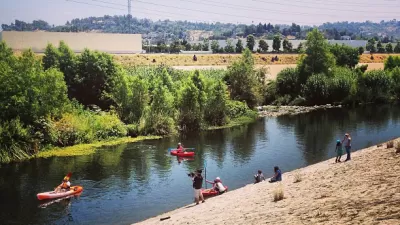James Brasuell, AICP is the former editorial director of Planetizen and is now a senior public affairs specialist at the Southern California Association of Governments. James managed all editorial content and direction for Planetizen from 2014 to 2023, and was promoted from manging editor to editorial director in 2021. After a first career as a class five white water river guide in Trinity County in Northern California, James started his career in Los Angeles as a volunteer at a risk reduction center in Skid Row. Prior to joining Planetizen, James worked at the Cal Poly Pomona College of Environmental Design, as an editor at Curbed LA, as editor of The Planning Report, and as a freelance contributor for The Architect’s Newspaper, the Urban Land Institute – Los Angeles Chapter, FORM, KCET, and the California Planning & Development Report.
On the Impending Doom of the Land Line
Many of us grew up with the telephone as a central appliance in our homes, around which much energy and attention revolved. The days of the land-line telephone, however, are numbered.
Massive Swan Kill Planned in New York
“Across millennia [mute swans] symbolized transformation and devotion, light and beauty,” says a recent article in Wired. Not so much in New York City, where the city’s population of mute swans will be reduced to zero to protect other native species.
Miami Dig ‘One of the Earliest Urban Plans in Eastern North America’
Plans to build “movie theaters, restaurants and a 34-story hotel” overlap with the archaeological site of a 2,000-year-old Tequesta village.
West Coast’s First Offshore Wind Energy Coming to Oregon
The West Coast’s first offshore wind project will use floating turbine technology not found in North America. The 5-turbine project near Coos Bay in Oregon is the first offshore wind energy for the West Coast.

Accommodating Floods Instead of Destroying Waterways
The flood management story of Boulder, Colorado, includes a successful encounter with a 1,000-year rain event, and its lessons are less about concrete and dams than one might think.

























